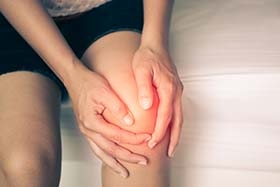Why do my joints hurt?
Aches and pains in your joints are a common result of injuries and can be a symptom of conditions such as arthritis.

Your joints are an essential part of your body’s structure. They consist of connected tissue, such as cartilage, that links your bones together and allows you to move. To function properly, they need to self-lubricate, move without friction, and work well even when compressed (for example, if you are carrying a heavy load).
Joints can be affected by various illnesses. They can also be injured during physical activity. Injuries and illness restrict your mobility and cause pain, swelling and inflammation – especially if untreated.
The knees are particularly vulnerable, but joint pain can strike anywhere from the shoulders to the ankles and feet. If it is acute, joint pain can last for weeks, chronic joint pain for months.
Fortunately, there are treatments available to help your joints heal, or to reduce painful and debilitating symptoms.
Tissue damage and fractures
Joint injuries include:
- A strain or sprain
- Damage to muscles or tendons (e.g. Tennis Elbow)
- Inflammation of joint lining or tendons
- A torn ligament
- Damage to cartilage
- Damage to the bursae (sacs that lubricate your joints)
All of these injuries can cause pain and inflammation, which leads to warm joints. These injuries are most often found in the hands, feed and wrists, with people who perform repetitive physical activities particularly at risk. In the workplace, typing or using a tool could be the cause; when exercising, jogging or playing a racquet sport could be responsible.
You can manage your injury by resting the joint, elevating it above the level of your heart, wearing a brace or wrap and applying an ice pack several times per day to relieve pain and inflammation. In addition, supplements – containing glucosamine, for example – can provide important nutrients to your joints.
However, if you have a joint injury you should also consult your GP for a diagnosis and recommendations on treatment.
Pain and inflammation can be eased using over-the-counter anti-inflammatory drugs such as ibuprofen or aspirin, but if you are experiencing severe pain you might be offered a stronger, prescription medication. Physiotherapy can help to restore your range of motion, and losing weight can reduce pressure on the painful joint (if you are overweight in the first place).
Seek immediate medical assistance if you cannot use the joint, if the pain is intense, or if you experience sudden joint inflammation or deformity.
Long-term illnesses
Joint pain can also be a symptom of various chronic illnesses:
- Arthritis is the leading cause of disability in people over the age of 55. Common forms of this illness such as rheumatoid arthritis cause joint pain and long-term damage.
- Gout is a buildup of uric acid in the joints, usually in the feet, which can cause serious pain in repeated attacks.
- Lyme disease is a tick-borne bacterial illness. The late stages can include joint pain, even after the bacteria are dead.
- Rheumatic fever is a complication of strep throat which can cause hot, swollen joints
If you suspect that you might have one of these conditions, you should consult your doctor immediately. Unfortunately, there is no current cure for common forms of arthritis, but quickly beginning a course of treatment might help to prevent further joint damage.
There are also various treatments available to provide relief from the joint pain and heat caused by these conditions, even where no permanent solution exists.
Treatment and relief
In some cases, it is possible to resolve the underlying issue that causes joint pain. For example, the symptoms of arthritis can be eased with disease-modifying anti-rheumatic drugs (DMARDs) or a doctor might suggest steroid injections directly into the painful joint.
Changes in lifestyle and diet also play an important role in inflammation. Consider yoga or swimming, both gentle exercises that can help to ease symptoms without overexerting the joints.
Include in your diet foods rich in anti-inflammatory nutrients:
- Oily fish such as mackerel, sardines and salmon, contain omega-3 fatty acids, which have been shown to affect inflammation.
- Fruits, especially cherries and citrus fruits, are packed with vitamin C and polyphenols, well studied anti-inflammatory nutrients.
- Peppers are also rich in vitamin C. Moreover, chilli peppers contain capsaicin, an analgesic often used as an arthritis treatment.
- Capsaicin, taken from chilli peppers, is an analgesic often used as an arthritis treatment.
- Dark leafy vegetables such as broccoli and spinach are packed with antioxidants, which can protect cells from inflammation.
